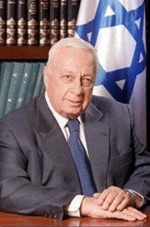2007年VOA标准英语-Israelis Reflect on Turbulent Year After Sharon(在线收听)
By Robert Berger
Jerusalem
06 January 2007
It has been a year since former Israeli Prime Minister Ariel Sharon suffered a massive stroke, leaving him in a coma that ended his political career. Israelis are still lamenting his loss and reflecting on how things might have been had he remained at the helm. Robert Berger reports from VOA'S Jerusalem bureau.
 |
| Ariel Sharon |
Mr. Sharon's successor, Prime Minister Ehud Olmert, has been harshly criticized for his handling of the war, and his popularity has plunged. A recent poll showed that 77 percent of Israelis disapprove of his performance.
That has raised questions about whether the popular Mr. Sharon, a former general and war hero, would have done things differently.
"In essence, what you had after he was incapacitated was like Murphy's Law: If anything can go wrong it will go wrong," said Ra'anan Gissin, who was Mr. Sharon's adviser for 10 years. "And the war went wrong, or at least not as we expected. If Sharon was there today, at least there would have been a sense of direction."
But Mr. Sharon also has his critics. Many Israelis say his term went downhill after he pulled Israel out of the Gaza Strip in 2005. Yaffa Reuveni, a teacher in Jerusalem, told VOA that Sharon's expulsion of 8,000 Gaza settlers was inexcusable.
"He was very cynical. He make [made it] very bad for [a] lot of people. [A] lot of people are without money, without home, without work and I don't agree with this," said Reuveni.
While Israelis debate Ariel Sharon's legacy, there is little disagreement that he would have handled the war in Lebanon more prudently than Mr. Olmert, who has little military experience. Gissin says Mr. Sharon would not have gone to a war he could not win.
"If he was awake today and in his full capacity, I doubt very much that the developments that took place would have taken place," he added. "In other words, the fact that the war in Lebanon went as it was. Maybe there wouldn't have been a war in Lebanon."
A popular joke making the rounds has Mr. Sharon waking up from his coma. When he finds out that people with no security experience are now prime minister and defense minister, he is utterly dismayed and decides to go back to sleep.